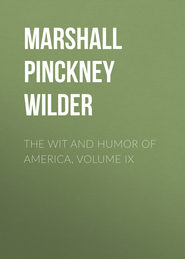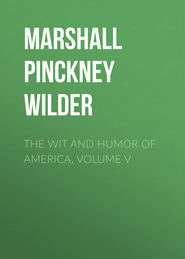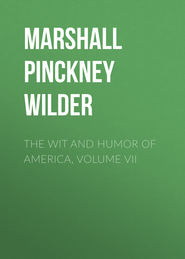По всем вопросам обращайтесь на: info@litportal.ru
(©) 2003-2024.
✖
The Wit and Humor of America, Volume VI
Автор
Год написания книги
2019
Настройки чтения
Размер шрифта
Высота строк
Поля
"'Is we got a goose? Didn't you help pick it?'
"I see whar my hair was short, an' I snatched up a hot dish from de hearth, opened de oven do', an' slide de goose in jes as he was, an' lay him down befo' Marsa John.
"'Now see what de ladies'll have for dinner,' says old marsa, pickin' up his caarvin' knife.
"'What'll you take for dinner, miss?' says I. 'Baked ham?'
"'No,' she says, lookin' up to whar Marsa John sat; 'I think I'll take a leg ob dat goose'—jes so.
"Well, marsa, cut off de leg an' put a little stuffin' an' gravy on wid a spoon, an' says to me, 'Chad, see what dat gemman'll have.'
"'What'll you take for dinner, sah?' says I. 'Nice breast o' goose, or slice o' ham?'
"'No; I think I'll take a leg of dat goose,' he says.
"I didn't say nuffin', but I knowed bery well he wa'n't a-gwine to git it.
"But, Major, you oughter seen ole marsa lookin' for der udder leg ob dat goose! He rolled him ober on de dish, dis way an' dat way, an' den he jabbed dat ole bone-handled caarvin' fork in him an' hel' him up ober de dish an' looked under him an' on top ob him, an' den he says, kinder sad like:
"'Chad, whar is de udder leg ob dat goose?'
"'It didn't hab none,' says I.
"'You mean ter say, Chad, dat de gooses on my plantation on'y got one leg?'
"'Some ob 'em has an' some ob 'em ain't. You see, marsa, we got two kinds in de pond, an' we was a little boddered to-day, so Mammy Jane cooked dis one 'cause I cotched it fust.'
"'Well,' said he, lookin' like he look when he send for you in de little room, 'I'll settle wid ye after dinner.'
"Well, dar I was shiverin' an' shakin' in my shoes, an' droppin' gravy an' spillin' de wine on de table-cloth, I was dat shuck up; an' when de dinner was ober he calls all de ladies an' gemmen, an' says, 'Now come down to de duck pond. I'm gwineter show dis nigger dat all de gooses on my plantation got mo' den one leg.'
"I followed 'long, trapesin' after de whole kit an' b'ilin', an' when we got to de pond"—here Chad nearly went into a convulsion with suppressed laughter—"dar was de gooses sittin' on a log in de middle of dat ole green goose-pond wid one leg stuck down so, an' de udder tucked under de wing."
Chad was now on one leg, balancing himself by my chair, the tears running down his cheek.
"'Dar, marsa,' says I, 'don't ye see? Look at dat ole gray goose! Dat's de berry match ob de one we had to-day.'
"Den de ladies all hollered, an' de gemmen laughed so loud dey yerd 'em at de big house.
"'Stop, you black scoun'rel!' Marsa John says, his face gittin' white an' he a-jerkin' his handkerchief from his pocket. 'Shoo!'
"Major, I hope to have my brains kicked out by a lame grasshopper if ebery one ob dem gooses didn't put down de udder leg!
"'Now, you lyin' nigger,' he says, raisin' his cane ober my head, 'I'll show you'—
"'Stop, Marsa John!' I hollered; ''t ain't fair, 't ain't fair.'
"'Why ain't it fair?' says he.
"''Cause,' says I, 'you didn't say "Shoo!" to de goose what was on de table'."
Chad laughed until he choked.
"And did he thrash you?"
"Marsa John? No, sah. He laughed loud as anybody; an' den dat night he says to me as I was puttin' some wood on de fire:
"'Chad, where did dat leg go?' An' so I ups an' tells him all about Henny, an' how I was lyin' 'case I was 'feared de gal would git hurt, an' how she was on'y a-foolin', thinkin' it was my goose; an' den de ole marsa look in de fire for a long time, an' den he says:
"'Dat's Colonel Barbour's Henny, ain't it, Chad?'
"'Yes, marsa,' says I.
"Well, de next mawnin' he had his black horse saddled, an' I held the stirrup for him to git on, an' he rode ober to de Barbour plantation, an' didn't come back till plumb black night. When he come up I held de lantern so I could see his face, for I wa'n't easy in my mine all day. But it was all bright an' shinin' same as a' angel's.
"'Chad,' he says, handin' me de reins, 'I bought yo' Henny dis arternoon from Colonel Barbour, an' she's comin' ober to-morrow, an' you can bofe git married next Sunday.'"
UNCONSCIOUS HUMOR
BY J.K. WETHERILL
Perhaps unconscious humor does not appeal to the more amiable side of our sense of mirth, for it excites in us a conceited feeling of superiority over those who are making us laugh,—but its unexpectedness and infinite variety render it irresistible to a certain class of minds. The duly labeled "joke" follows a certain law and rule; whereas no jester could invent the grotesqueries of the unconscious humorist.
As a humble gleaner after the editorial scythe,—or, to be truly modern, I should say mowing-machine,—I have gathered some strange sheaves of this sort of humor. Like many provincial newspapers, that to which I am attached makes a feature of printing the social happenings in villages of the surrounding country, and these out-of-town correspondents "don't do a thing to" the English language. One of them invariably refers to the social lights of his vicinity as "our prominent socialists," and describes some individual as "happening to an accident." To another, every festal occasion is "a bower of beauty and a scene of fairyland." Blue-penciling they resent, and one of them wrote to complain that a descriptive effort of his had been "much altered and deranged." The paper also publishes portraits of children and young women, and it is in the descriptions accompanying these pictures that the rural correspondent excels himself. One wound up his eulogy in an apparently irrepressible burst of enthusiasm: "She is indeed a tout ensemble." A child of six months was described as "studious"; and another correspondent went into details thus: "Little Willie has only one large blue eye, the other having been punched out by his brother with a stick, by accident." A small child was accredited with "a pleasing disposition and a keen juvenile conception."
The following are some of the descriptive phrases applied to village belles: "She is perfectly at home on the piano, where her executions have attained international celebrity." … "She possesses a mine of repartee and the qualities which have long rendered illustive her noble family." … "Her carriage and disposition are swan-like." … "Her eyes can express pathetic pathos, but flash forth fiery independence when her country's name is traduced." … "She has a molded arm, and her Juno-like form glides with a rhythmic move in the soft swell of a Strauss." … "Her chestnut hair gives a rich recess to her lovely, fawnlike eyes, which shine like a star set in the crown of an angel." … One writer becomes absolutely incoherent in his admiration, and lavishes a mixture of metaphors upon his subject: "She portrays a picture worthy of a Raphael. She dances like the fairies before the heavenly spirits. She looks like a celestial goddess from an outburst of morning-glories; her lovely form would assume a phantomlike flash as she glides the floor, as though she were a mystic dream."
Scarcely less rich in unconscious humor are some of the effusions of those who have literary aspirations. A descriptive article contains a reference to "a lonely house that stood in silent mutiny." "Indians who border on civilization, an interesting people in their superstitious way," infested the vicinity, and one of the points of interest was the Wild Man's Leap, "so called from an Indian who is said to have leaped across to get away from some men who were trying to expatriate him." An aspirant made this generous offer: "I will write you an article every week if you so wish it, as I have nothing to do after supper." Modest was the request of another, concerning remuneration: "I do not ask for money, but would like you to send me a small monkey. I already have a parrot."
But no finer specimen of unconscious humor has ever fallen under the sub-editorial eye than "The Beautiful Circus Girl." In these enterprising days rising young authors sometimes boast in print of their ignorance of grammar and spelling, but the author of the aforementioned bit of fiction surpasses them all in that respect. It seems only just that such a unique gem should be rescued from the dull obscurity of the waste-basket.
THE BEAUTIFUL CIRCUS GIRL
Some years ago the quaint but slow little village of Mariana was all on the qui-of-eve with excitement. Pasted on every tree and sign was announcements of Hall's circus, and the aperence of pretty Rose Floid in the pearless feets of tight-rope dancing, and Seignor Paul Paulo as her attendent. All the vilage was agog, for in their midst had old Hall and his Wife whome he always (spoke of as the Misus) taken a small but quaint cotage, so as to make quiet and please Rose whose guardien he was.
In the distanse was seen an advancing teem, and mounted on its box driving was W. Alexander, distinguished as to aperence, tallent, and that charm, money. He was of the most patricien aristocrats of the place. Placed on the summit of one of those hils that spring up in the most unexpected ways and degrees was the quaint old Tudor mansion of the Alexanders called Waterloo, in rememberence of the home of his ancestors which now rests on the banks of the Potomack; a legend as to war and romance. Though bearing with him all the honners that Cambridg could confere, W. Alexander was a faverite in the vilage, being ever ready with a kind enquiry as to Parent, or peny for marbles, not forgetting his boyhoods days. Though the beau par excelant of the vilage, and posessing vast landed estate and a kind retinu, he was not haughty.
Every one was eger to see Rose perform. She in her pasage too and frow had won by her sweet manners (many likings) ere she exhibited her skill.
The eventful hour of promis came and what a crowd was there. Rose came fourth, asisted by Paul Paulo. His form was molded even as an Apolo, and his eger eye was fixed on the bony girl. She ballanced her pole, saught her equiliberum, and every heart was at her desposal, not accepting W. Alexander. Seeing this, the dark pashonate eye of the Italian scowled.
So droped the curtain of the first performance. And W. Alexander stroled on towards his home, heart and head full of the beautiful circus girl, thoughts were very conflicting, love at first sight.
(We will skip, for want of space, the exquisite passages descriptive of the mutual love of Rose and W. Alexander, and pass on to the finale.)
There was a paus, a sencation, and Rose came fourth to meander in mid-air. Admeration was at its hight, as she swayed too and frow as it were a winged egle from some etherial climb.
Low! a paus—the rope snaps—and Rose falls to erth a helpless mass of youth and beauty. The venerable man of medicin closed her star-lit eyes now forever dimed to this world. And all knew she had walked the last rope that bound her to this erth.








